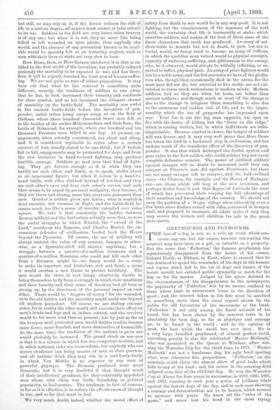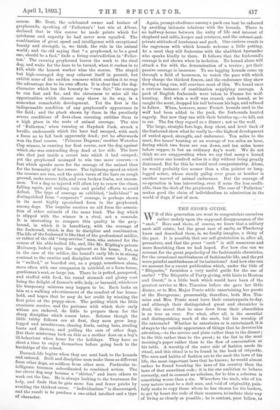GREYHOUNDS AND FOXHOUNDS.
THE loss of a dog is not, as a rule, an event which con- cerns any one but his owner, however interesting the creature may have been as a pet, or valuable as a property. Bat the news that Fullerton,' the famous greyhound, has mysteriously disappeared from the house of his owner, Colonel North, at Eltham, in Kent, where it seemed that he was destined to spend the remainder of his days in the honour and repose which fall to the lot of dogs and horses of the heroic mould, has enlisted publics sympathy as much for the dog as for his master. Judged by the space devoted to the circumstances of his disappearance in the newspapers, the popularity of ' Fullerton ' was by no means confined to those whose taste in amusement leans in the direction of sport ; and the interest taken in his fate must be ascribed to something more than the usual regard shown by the public for old favourites of the racecourse or the leash. 'Fullerton' is not only among the finest animals of his breed, but has been shown by the severest tests to be absolutely the best dog, so far as physique and courage go, to be found in the world ; and in the opinion of most, the beat which the world has ever seen. He is a very large brindled greyhound, of almost perfect build, exceeding greatly in size the celebrated Master McGrath,' who was presented to the Queen at Windsor, after win- ning the Waterloo Cup for the third time, in 1871. 'Master McGrath' was not a handsome dog, his ugly head spoiling
what were otherwise fine proportions. Fullerton,' on the contrary, could claim the utmost share of good looks which falls to any of his kind ; and his career in the coursing-field eclipsed even that of the old Irish dog. He won the Waterloo Cup at Altear for four years in succession, in 1889, 1890, 1891, and 1892, running in each year a series of brilliant trials against the fastest dogs of the day, and in each case showing a courage and determination not to be beaten, which seemed to increase with years. He knew all the "rules of the game," and never lost his head in the most trying course. Mr. Dent, the celebrated owner and trainer of greyhounds, speaking of 'Fullerton's ' last win at Altcar, declared that in this course he made points which for quickness and sagacity he had never seen equalled. The
combination of great speed and intelligence with exceptional beauty and strength, is, we think, the rule in the animal world; and the old saying that "a greyhound, to be a good one, should be a fool," finds a living contradiction in Fuller- ton.' The cunning greyhound leaves the work to the rival dog, and waits for the hare to be turned, when it rushes in to kill, while the honest worker wins the course. The stupid but high-couraged dog may exhaust itself in pursuit, but exhibit none of the sudden resource which enables it to reap the advantage due to its own efforts. It is clear that the dog- character which has the honesty to "run fair," the courage to run fast and far, and the cleverness to seize all the Opportunities which chance may throw in its way, is a somewhat remarkable development. Yet the first is the indispensable condition of any greyhound's appearance in the field; and the pluck shown by them in the peculiarly severe conditions of first-class coursing entitles them to a high place in the scale of animal courage. The sire Of Fullerton,' when running at Haydock Park, struck a hurdle, underneath which the hare had escaped, with such a force as to fall back apparently dead; yet he afterwards won the final course. Princess Dagmar,' another Waterloo Cap winner, in running her first course, saw the dog against which she was contending drop dead at her side. The hare also died just inside a covert into which it had escaped; yet the greyhound managed to win two more courses,—a feat which speaks more for the courage of the animal than for the humanity of her owner. The lightning-speed at which the courses are run, and the quick turns of the hare on rough ground, make severe falls, and even broken limbs, not uncom- mon. Yet a dog so injured will often try to renew the chase, falling again, yet making vain and painful efforts to avoid defeat. The type of courage so exhibited, " individual " as distinguished from " corporate " courage, is perhaps shown in its most highly specialised form in the greyhound, among dogs. The impulse receives no aid from the associa- tion of other animals of the same kind. The dog which is slipped with the winner is a rival, not a comrade. It is interesting to compare this quality in the grey- hound, in which it is hereditary, with the courage of the foxhound, which is due to discipline and combination. The life of the foxhound is like that of the professional soldier, or rather of the old " long-service " man, who entered for the course of his able-bodied life, and, like Mr. Kipling's private Mulvaney, looked upon the regiment as his home. Yet, as in the case of the soldier, the hound's early life is in strong contrast to the routine and discipline which come later. He is "walked," or boarded out, as a puppy, sometimes alone, more often with one companion in mischief, at a farm-house, gentleman's seat, or large inn. There he is petted, pampered, and stuffed with food, his round stomach and gloisy coat being the delight of farmer's wife, lady, or barmaid, whichever his temporary mistress may happen to be. Each looks on him as a walking advertisement of the comfort of her house- hold, and hopes that he may do her credit by winning the first prize at the puppy-show. The petting which the little creatures receive, and the patience with which their early whims are endured, do little to prepare them for the sharp discipline which comes later. Solemn though the little tubby fellows are at first, they soon grow ion g- legged and mischievous, chasing fowls, eating hats, stealing boots and dusters, and pulling the ears of other dogs. But their mistresses look on this as a mother does on a boy's ill-behaviour when home for the holidays. They have so short a time to enjoy themselves before going back to the hardships of the school.
Barrack-life begins when they are sent back to the kennels and entered. Drill and discipline soon make them as different from other dogs, as soldiers from other men. Particular in- telligence becomes subordinated to combined action. The too clever dog may become a " ekirter," and leave others to work out the line. He is always looking to the huntsman for help, and finds that he gets more fun and fewer pricks by avoiding the thickest cover. "Individualism" is discouraged, and the result is to produce a one-sided intellect and a type o Character.
Again, prompt obedience among a pack can best be enforced by avoiding intimate relations with the hounds. There is no halfway-house between the unity of life and interest of shepherd and collie, keeper and retriever, and the colonel-and- private attitude of huntsman and pack. One curious result is the eagerness with which hounds welcome a little petting. At a meet they will fraternise with the shabbiest bystander who speaks kindly to them. It follows that the foxhound's courage is not shown when in isolation. No hound alone will attack a fox with the determination of a terrier ; yet their passive courage is immense. To see lagging hounds come up through a field of horsemen, to watch the pace with which they charge the thickest fences, and the endurance they show during a long run, will convince most of this. We heard once a curious instance of combination supplying courage. A pack of English foxhounds were taken to France for wolf- hunting. But when a wolf was roused, each hound, as he caught the scent, dropped his tail between his legs, and refused to follow. When, however, some French hounds used to the wolf had been added to the pack, the foxhounds hunted eagerly. But now they ran with their bristles up,—to kill, not to eat. The fox they regard as a dinner ; not so the wolf.
The large, straight fore-legs, deep chest, and level back of the foxhound show what he really is,—the highest development of united speed, strength, and endurance. Ten miles to the meet, five hours' hunting at an average of ten miles an hour, during which two foxes are run down, and ten miles home before supper, is but an ordinary day's work. We do not think we are exaggerating when we say that many a hound could cover one hundred miles in a day without being greatly distressed. But for this he would need companionship. Alone, he would probably tire sooner than a slim pointer or long- legged setter, whose steady gallop over grass or heather is another marvel of animal endurance. But the courage of co-operation is lees interesting, even if none the less credit- able, than the dash of the greyhound. The case of 'Fullerton' makes good the claim of individualism to admiration in the world of dogs, if not of men.



































 Previous page
Previous page